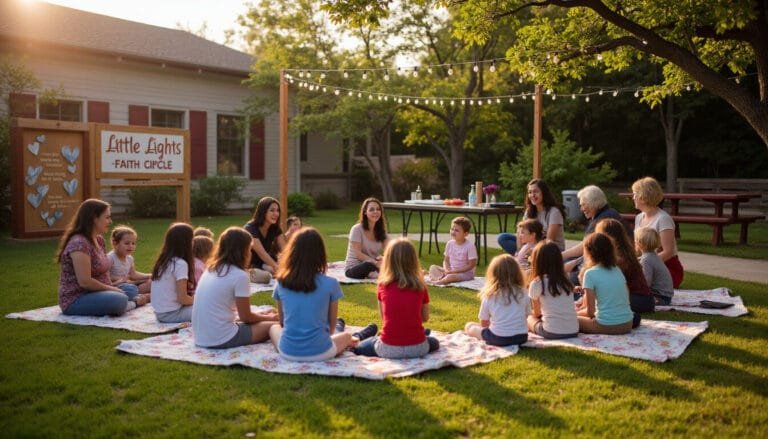In the beautiful journey of parenting, grace often feels like the gentle breeze that lifts us, guiding us through both the sunny days and the stormy nights. The grace factor in parenting isn’t just a fleeting concept; it’s a transformative approach that reshapes how we nurture, guide, and connect with our children. As we stand at the crossroads between discipline and discipleship, we are invited to explore deeper, more meaningful ways to shape our children’s hearts and minds. By embracing grace in parenting, we can create an environment rich in love, understanding, and growth, where our little ones feel safe to learn and flourish.
Transitioning from mere discipline — often associated with punishment and correction — to a nurturing form of discipleship requires a shift in perspective. It is about more than setting boundaries; it’s about instilling values, building character, and fostering a lifelong relationship with God. This journey is not just for our children but for us as parents, too. As we cultivate grace within our homes, we empower our children to navigate their own faith journeys, equipped with the tools they need to face life’s challenges. Join me as we delve into the heart of this grace-filled approach to parenting, uncovering practical insights and heartfelt stories that will inspire and uplift you on your path. Together, let’s discover how grace can transform our parenting from a series of disciplinary actions into a rich tapestry of discipleship and love.
- Understanding Grace in Parenting
- The Shift from Punishment to Guidance
- Instilling Values through Grace
- Practical Techniques for Grace-Focused Discipline
- Building Stronger Parent-Child Relationships
- Preparing Children for Their Own Faith Journeys
- Common Challenges and Solutions
- Real-Life Testimonials and Success Stories
- Embracing the Grace Factor
Understanding Grace in Parenting
Grace in parenting is a beautiful concept that transcends mere discipline; it embodies love, forgiveness, and understanding. In the context of parenting, grace means extending kindness and compassion to our children, even when they falter. It’s recognizing that our little ones are on a journey of growth and learning, just as we are. This grace-filled approach encourages us to respond with empathy rather than anger, creating a nurturing environment where children feel safe to express themselves, make mistakes, and learn from them.
The impact of grace on child development is profound. When parents embrace grace, they foster resilience and emotional intelligence in their children. For instance, when a child spills juice all over the table, a reaction steeped in grace might involve a gentle reminder about being careful while cleaning up together, rather than a harsh reprimand. This not only teaches responsibility but also shows the child that mistakes are opportunities for growth rather than occasions for shame. Children raised in grace-filled environments tend to develop a strong sense of self-worth and an understanding of the importance of empathy — skills they will carry into their own relationships throughout life.
Consider the family dynamic where grace is actively practiced. Imagine a scenario where siblings argue over toys. Instead of simply imposing a punishment or taking the toy away, a parent can step in to guide the conversation, encouraging each child to express their feelings and listen to one another. By facilitating this dialogue, the parent exemplifies how grace can lead to understanding and reconciliation. Such moments not only resolve conflicts but also instill lessons of cooperation and respect, reinforcing the notion that family bonds are built on love and mutual support.
Ultimately, understanding grace in parenting invites us to shift our perspective from merely disciplining our children to engaging in discipleship. It calls us to be guides who walk alongside our children as they navigate life’s complexities, modeling the principles of grace and forgiveness that we hope they will carry into their own lives. By doing so, we lay the foundation for strong character development, meaningful relationships, and spiritual growth that will resonate long after they leave the nest.
The Shift from Punishment to Guidance
As parents, it’s easy to fall into the trap of viewing discipline as a necessary evil — something we must do to correct behavior. However, there’s a profound difference between punishment and constructive guidance. Punishment often stems from frustration, leaving children feeling ashamed or resentful, while constructive guidance invites them to learn and grow from their mistakes. Imagine instead of a stern reprimand for a spilled drink, you approach it as an opportunity to teach responsibility. “Let’s clean this up together,” you might say. This shift in perspective not only fosters a sense of partnership but also reinforces the idea that mistakes are a part of learning.
Discipline can truly be reframed as teaching moments when we view our role not just as enforcers of rules, but as mentors guiding our children through the complexities of life. For instance, if your child lashes out in anger during a playdate, instead of simply punishing them, you might take a moment to explore the underlying feelings together. You could ask questions like, “What made you feel upset?” or “How could we handle that situation differently next time?” By guiding them through their emotions, you’re equipping them with the tools they need to navigate their feelings in the future — a gift that extends far beyond any disciplinary measure.
Empathy plays an essential role in effective parenting and is a cornerstone of transitioning from punishment to guidance. When we respond to our children with understanding and compassion, we create a safe space where they feel valued and heard. For example, if your teenager is struggling with schoolwork and reacts with frustration, responding with empathy can make all the difference. Instead of expressing annoyance at their attitude, you might say, “I can see this is really hard for you. How can I help?” This not only diffuses tension but also models forgiveness — teaching them that it’s okay to struggle and seek support. Empathy fosters a nurturing environment where children learn that they can trust you to guide them, even when they stumble.
In embracing this shift from punishment to guidance, we cultivate a home filled with grace, where forgiveness flows freely and lessons are learned without the heavy burden of guilt. It transforms discipline into discipleship, allowing our children to flourish in their emotional and spiritual growth.
Instilling Values through Grace
In the heart of every parent lies the desire to raise children who are not only kind and respectful but also possess a strong moral compass. This is where the power of grace in parenting shines through, particularly when it comes to the essential value of forgiveness. Imagine a scenario where your child accidentally spills juice on the living room carpet. Instead of reacting with frustration or punishment, you take a deep breath and respond with understanding, gently guiding them to clean up the mess together. This moment becomes a beautiful opportunity for teaching forgiveness — not just for the spill but for life’s little mistakes. By modeling grace, you show your child that everyone makes errors, and it’s our response to those errors that truly matters.
Encouraging moral growth and character development goes hand-in-hand with instilling values through grace. When parents approach discipline with empathy, they create a safe space for children to learn from their actions without fear of harsh judgment. For instance, if a child struggles with sharing their toys, rather than imposing strict consequences, consider discussing how sharing makes others feel happy. This not only teaches them about empathy but also about the joy that comes from being generous. By framing these lessons within the context of grace, children can internalize values that foster their moral development in a nurturing environment.
One effective strategy for modeling grace to children is through storytelling. Share personal stories from your own life where grace played a pivotal role — perhaps times when you needed forgiveness or when someone extended grace to you during a challenging moment. These anecdotes serve as powerful illustrations of how grace can transform relationships and encourage moral integrity. Additionally, engage in family discussions about scenarios they might encounter at school or in friendships, prompting them to think about how they might respond with empathy and grace. By doing so, you empower your children to cultivate their own sense of compassion and understanding as they navigate their world.
Ultimately, instilling values through grace requires intentionality and patience. As parents, we must remember that it’s not just about correcting behavior but nurturing hearts. By embracing grace in parenting, we create an environment where our children can thrive emotionally and morally, preparing them not only for their present but for the lives they will lead as compassionate individuals in the future.
Practical Techniques for Grace-Focused Discipline
Implementing grace in everyday situations doesn’t have to be complicated; it can be as simple as adjusting our language and approach. For instance, when setting expectations, instead of issuing commands like “You need to clean your room now!” try a more compassionate approach: “I know you’ve been busy, but let’s work together to tidy up your space so it feels welcoming.” By inviting your child into the process rather than demanding compliance, you foster an environment where they feel valued and understood. This small shift not only encourages cooperation but also nurtures their moral growth as they learn the importance of collaboration and responsibility.
Conflict resolution is another area where grace can profoundly change the dynamics of parent-child interactions. Imagine a scenario where siblings are bickering over a toy. Instead of immediately stepping in with punishment, you might say, “It sounds like you both really want to play with that toy. How about we take turns, and I’ll set a timer?” This approach teaches children to empathize with one another’s feelings while also providing them with the tools to resolve conflicts amicably. By modeling grace during these moments, you’re helping them develop crucial problem-solving skills and reinforcing the idea that disagreements can lead to constructive outcomes.
Communication is key in a grace-focused discipline strategy. When addressing behavior that needs correction, use “I” statements to express feelings without assigning blame. For example, instead of saying, “You never listen to me!” you could say, “I feel frustrated when I have to repeat myself.” This not only models effective communication but also helps your child understand how their actions affect others, promoting emotional intelligence and moral growth. By maintaining an open dialogue infused with compassion, you create a safe space for your children to express themselves and learn from their mistakes.
Lastly, consistency is vital in implementing these techniques. Make it a habit to check in with your children about their understanding of family values and expectations. Regular family meetings can serve as a platform for discussing challenges and celebrating successes. Encourage your children to share their thoughts on how grace plays a role in their lives, reinforcing the lessons learned through daily experiences. By weaving grace into the fabric of your parenting approach, you cultivate not just compliant children but thoughtful individuals who will carry these moral lessons into their own relationships and communities.
Building Stronger Parent-Child Relationships
In a grace-filled home, trust and respect lay the foundation for deeper connections between parents and children. When children feel secure in their relationships with their parents, they are more likely to express themselves openly and honestly. Imagine a scenario where a child makes a mistake — perhaps they broke a favorite vase during playtime. Instead of reacting with anger, a parent can approach the situation with grace in parenting, acknowledging the child’s feelings of shame while expressing understanding. This gentle response not only preserves the child’s self-esteem but also reinforces the idea that mistakes are part of learning. Over time, this consistent practice builds a trusting relationship where children feel safe to share their thoughts and emotions without fear of judgment.
Grace fosters open communication, transforming potential conflicts into opportunities for meaningful discussions. For instance, consider a teenager who feels overwhelmed by school pressures. By creating an atmosphere of grace, parents can encourage their child to articulate their struggles rather than retreating into silence or rebellion. Utilizing teaching methods rooted in empathy — such as active listening and validating emotions — can pave the way for candid conversations. When children know their feelings are acknowledged and respected, they are more inclined to engage in dialogue about challenges they face, fostering a nurturing environment where both parties learn from each other.
Understanding is another crucial element in strengthening emotional bonds within the family. Picture a situation where a child is acting out due to underlying anxiety or frustration. Instead of solely addressing the behavior, parents can take a step back to explore the “why” behind it. By approaching these moments with grace, parents can ask open-ended questions that prompt reflection and discussion, such as, “What’s been on your mind lately?” This approach not only aids in identifying the root causes of behavior but also communicates to children that their experiences matter. Through this lens of understanding, parents create a space where children feel valued and loved, reinforcing their emotional connection and encouraging healthy self-expression.
Ultimately, building stronger parent-child relationships through grace transforms the dynamic within the family. It nurtures trust, promotes open lines of communication, and deepens emotional bonds. As parents embrace these principles, they cultivate an environment that not only supports their children’s growth but also enriches their own parenting journey. By prioritizing grace in parenting, families can experience the profound impact of love and understanding in their daily interactions.
Preparing Children for Their Own Faith Journeys
As parents, one of our most profound responsibilities is to nurture the spiritual growth of our children. Instilling faith isn’t just about teaching them stories from sacred texts; it’s about guiding them to explore their own beliefs and values. Spiritual growth is an integral part of a child’s development, providing a strong foundation that supports their journey through life’s challenges. When we approach this journey with grace, we create a nurturing environment that allows our little ones to feel safe and supported in their exploration.
Encouraging children to explore their faith can be done through simple yet impactful parenting strategies. For instance, rather than presenting faith as a set of rules to follow, invite your child into conversations about what spirituality means to them. Take walks in nature and discuss how the beauty around us reflects a higher power, or share personal stories of your own faith journey during bedtime. These intimate moments not only foster curiosity but also allow children to see that faith is a living, breathing aspect of life — one that can evolve as they do.
Moreover, supporting your child’s spiritual development means creating space for questions and uncertainties. Instead of shying away from difficult topics, embrace them with openness. Encourage your child to ask “why” and “how,” and engage with their questions honestly, using grace as your guide. This approach can transform doubt into understanding and fear into confidence as they learn that faith is not about having all the answers, but about seeking them together.
Ultimately, by modeling grace and compassion in our parenting strategies, we prepare our children for their own faith journeys. We teach them that it’s okay to stumble and that every misstep is an opportunity for growth. As they navigate their unique paths, they’ll carry with them the assurance that they are loved unconditionally and that their journey — just like ours — is beautifully imperfect.
Common Challenges and Solutions
Transitioning to a grace-based approach in parenting can be met with resistance, both from children and parents themselves. Children may initially react with confusion or even push back against the softer, more forgiving style of discipline they’re not used to. For example, if a child is accustomed to strict consequences for misbehavior, introducing grace can feel like letting them off the hook. It’s important for parents to communicate clearly about this shift, explaining that grace doesn’t mean a lack of boundaries but rather an opportunity for growth and learning through love. This dialogue lays the groundwork for understanding that grace in parenting is a pathway to nurturing their faith journeys.
As parents embrace this new approach, feelings of guilt and frustration may surface. Many parents worry that showing too much grace might lead to a lack of discipline or that they are failing their children by not maintaining strict rules. It’s crucial to remind ourselves that grace does not equate to permissiveness; rather, it creates a safe space for children to learn from their mistakes without fear of harsh judgment. For instance, when a child makes a poor decision, instead of reacting with anger, a parent might ask open-ended questions like, “What do you think you could have done differently?” This not only helps the child reflect but also reassures them that they are loved unconditionally, fostering a deeper connection built on trust.
Consistency is key in implementing grace-centered discipline. Parents might find it helpful to establish family guidelines that reflect grace as a core value. Creating a family mission statement focused on grace can serve as a reminder during challenging moments. Additionally, implementing regular family meetings allows everyone to express their feelings and adjust expectations together. These shared moments cultivate an environment where grace is practiced daily, reinforcing the idea that we all make mistakes but can learn and grow from them. Remember, embracing this journey with authenticity and openness makes the path smoother for both parents and children alike, ultimately enriching their faith journeys together.
Real-Life Testimonials and Success Stories
In the journey of parenting, many have discovered the transformative power of grace. Take Sarah, a mother of three, who once relied heavily on traditional disciplinary methods. After attending a workshop on grace-filled parenting, she decided to shift her approach. Instead of reacting with frustration when her children misbehaved, she began to ask questions like, “What’s going on here?” and “How can we solve this together?” The results were astounding! Sarah shared that her children became more open and communicative, allowing for deeper discussions about their feelings and choices. This shift not only improved her family dynamics but also fostered significant child development — her children began to express empathy and problem-solving skills they hadn’t shown before.
Educators like Mr. Thompson, a middle school teacher, have also witnessed the benefits of incorporating grace into the classroom. He recalls a student named Jake, who often acted out due to underlying issues at home. Instead of punishing him for disruptive behavior, Mr. Thompson chose to extend grace by inviting Jake to share his story privately. This act of kindness not only built trust but also encouraged Jake to take responsibility for his actions in a supportive environment. Mr. Thompson noted that this strategy not only helped Jake flourish academically but also inspired other students to show compassion toward one another, reinforcing a culture of understanding and respect within the classroom.
Counselors have echoed these sentiments through their work with families. For instance, Dr. Emily, a family therapist, recently shared a case study involving the Morales family. Initially struggling with communication and conflict resolution, the parents adopted a grace-centered approach after participating in family counseling sessions. By modeling forgiveness and compassion in their interactions, they found that their children began to mirror these behaviors at home and in social settings. The impact was profound; the children developed resilience and emotional intelligence, leading to improved relationships with peers and increased confidence in their abilities.
These testimonials illuminate a beautiful truth: grace is not just an abstract concept but a practical tool that can enrich child development and strengthen family bonds. As parents and educators embrace this philosophy, they cultivate environments where children can thrive — emotionally, socially, and spiritually. When grace becomes the foundation of parenting, it opens doors to growth that extend far beyond discipline, nurturing future generations equipped with empathy and integrity.
Embracing the Grace Factor
As we conclude our journey through the grace factor in parenting, it’s clear that embracing grace can transform not only our approach to discipline but also the very fabric of our family dynamics. When we shift from mere punishment to a heart-centered discipleship, we open the door to deeper connections, fostering an environment where children feel safe to grow, explore, and thrive. This journey invites us to model forgiveness, empathy, and understanding — qualities that reflect the very essence of grace in parenting.
I encourage every parent to take this message to heart and embrace the grace factor in their daily interactions with their children. By cultivating a nurturing space filled with love and encouragement, you are not only guiding your children through life’s challenges but also preparing them for their own faith journeys. Remember, parenting is not about perfection; it’s about progress. So, let grace lead the way, and watch as your family flourishes in the warmth of unconditional love and support.
Affiliate Disclosure: This post may contain affiliate links. If you purchase through these links, I may earn a small commission at no extra cost to you.
Thank you for supporting Little Lights Bible Stories!





